Find products from the CCRS Center that are practical and research-based to support states with implementing college and career readiness initiatives. Our products include reports, briefs, fact sheets, guides, and tools on topics varying from lifelong learning skills, career pathways, and measures of college and career readiness.
Products
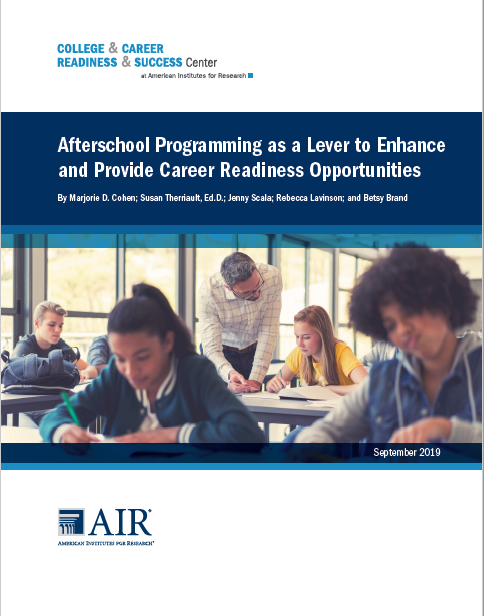 |
Afterschool Programming as a Lever to Enhance and Provide Career Readiness Opportunities Discover how afterschool programming can be a lever to provide college and career opportunities for students. |
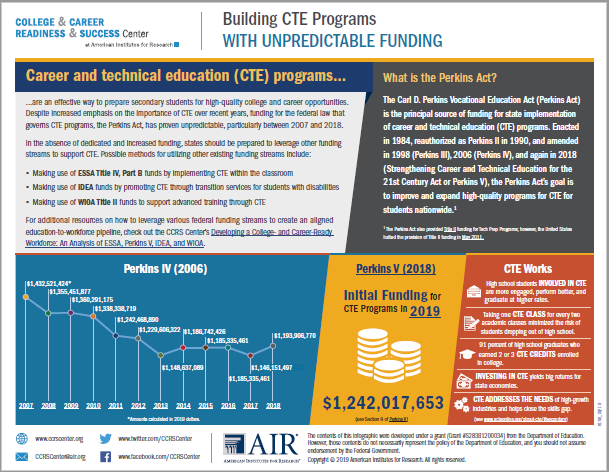 |
Building CTE Programs with Unpredictable Funding Explore how to invest in Career and Technical Educations (CTE) programs with unpredictable funding. |
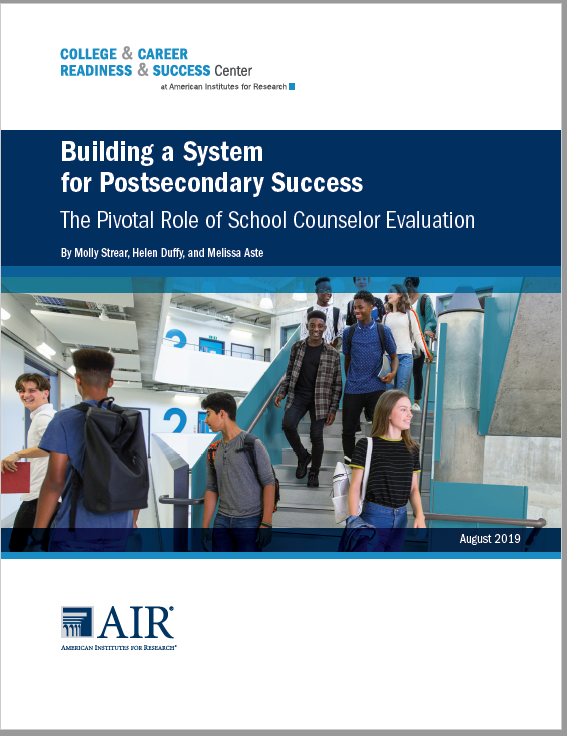 |
Building a System for Postsecondary Success: The Pivotal Role of School Counselor Evaluation Learn how school counselors can support postsecondary and career-readiness initiatives. |
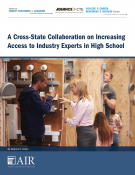 |
A Cross-State Collaboration on Increasing Access to Industry Experts in High School (Working Group Report) Discover strategies to ensure learners have access to knolwedgeable industry experts in the classroom. |
|
|
How ESSA and IDEA Can Support College and Career Readiness for Students with Disabilities Learn how to promote college and career readiness for students with disabilities. |
|
|
CBE 360 Survey Toolkit |
|
|
Evidence-Based Practices Supporting College and Career Readiness in High School: Early College High School Explore Early College High Schools as an evidenced-based practice to support high school college and career readiness.
|
|
|
Evidence-Based Practices Supporting College and Career Readiness in High School: Early Warning Indicators Explore early warning indicators as an evidenced-based practice to support high school college and career readiness.
|
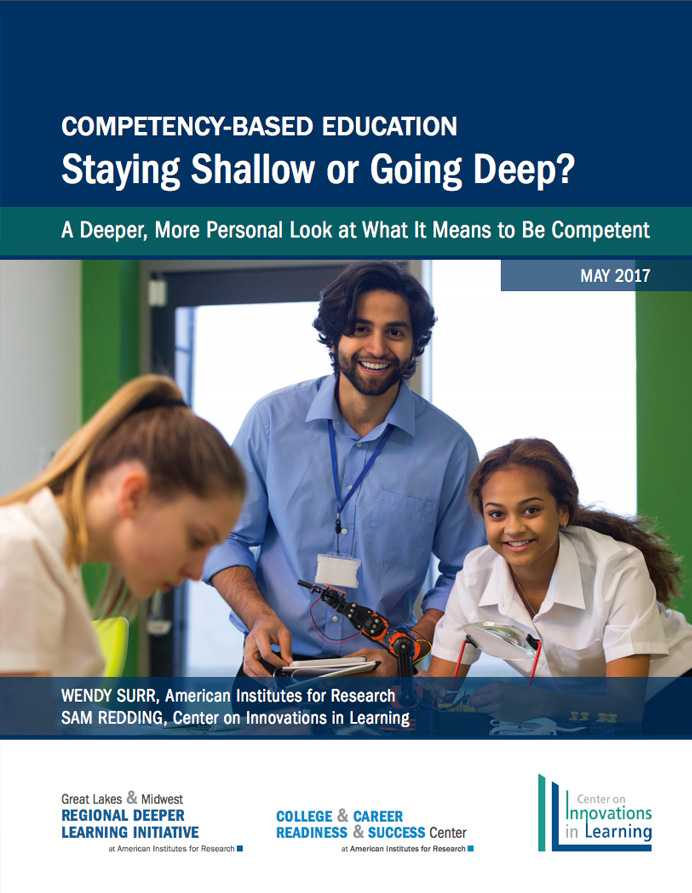 |
Competency-Based Education: Staying Shallow or Going Deep? In order to be successful in the 21st century, students will need to master an expanded set of competencies that extends beyond discrete academic standards. Competency-based education (CBE) is an educational approach that focuses on mastery of these competencies – rather than seat time – as a measure of student learning. This approach is being adopted by a growing number of educators focused on ensuring students graduate college and career ready. |
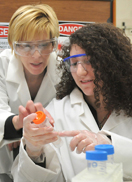 |
Designing Assessments for College and Career Readiness: Performance Tasks How can educators assess students’ college and career readiness, particularly the deep content knowledge and complex skills required with new standards? Performance tasks are one way to assess students’ college and career readiness because they require students to produce authentic work that demonstrates their mastery of specific skills and content. |
|
|
Lifelong Learning Skills for College and Career Readiness: Considerations for Education Policy Lifelong Learning Skills (LLS) provide the foundation for learning and working. They broadly support student thinking, self-management, and social interaction, enabling the pursuit of education and career goals. Collectively, LLS are the means by which students master academic content and translate knowledge into action. |
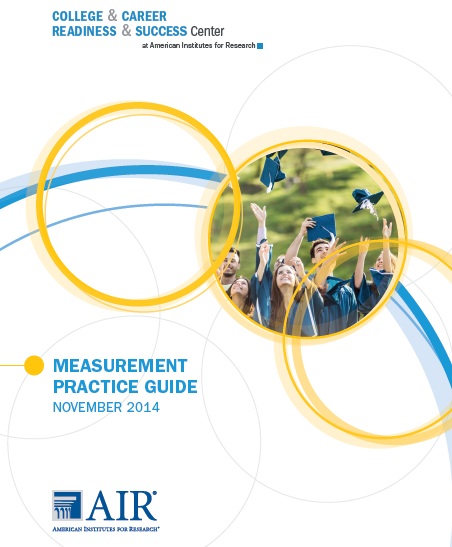 |
Measurement Practice Guide This discussion guide is part of a larger practice guide designed to help state education agencies (SEAs) define measurement goals, select college and career readiness measures and indicators designed to support those goals, and use the data gathered with those measures and indicators to make informed decisions about college and career readiness policies, programs, and interventions. The chapter 1 discussion guide focuses on setting the stage for the rest of the guide by defining the measurement landscape and exploring the SEA role in measurement goals related to college and career readiness a |
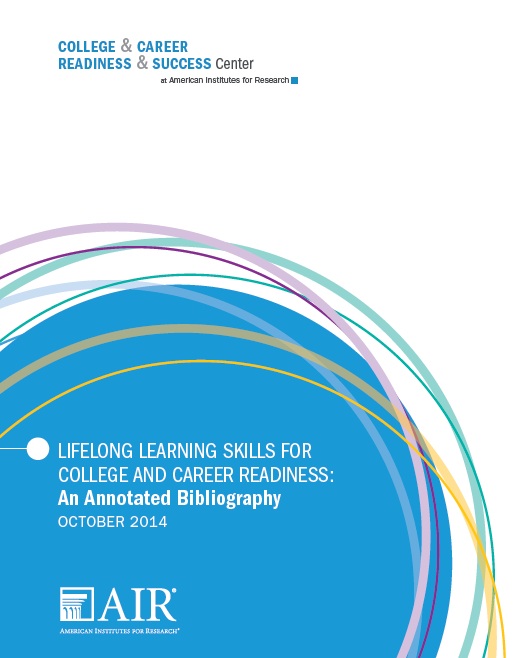 |
Lifelong Learning Skills for College and Career Readiness: An Annotated Bibliography This annotated bibliography provides guidance and catalogs resources designed to explain what lifelong learning skills are, how they impact and relate to college and career readiness and success outcomes, and how they can be taught and measured in the classroom, across the pre-kindergarten to workforce (PK-20W) spectrum. |
|
|
Overview: State Definitions of College and Career Readiness This overview highlights common elements of state definitions of college and career readiness. A definition of college and career readiness can help build an understanding of the necessary knowledge, skills, and dispositions of learners who are prepared for postsecondary success. In addition, these definitions can guide efforts to identify which students are on track for postsecondary success and support state efforts to achieve their visions that all students receive the multidimensional preparation necessary for success in the global economy. |
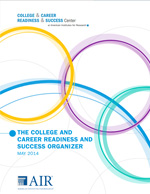 |
The College and Career Readiness and Success Organizer The Organizer is a graphic that displays a consolidated overview of the many elements that impact a learner’s ability to succeed in college and careers at both the institutional and individual levels. Originally created by the National High School Center, the revised Organizer incorporates feedback and insights provided by content-area experts representing diverse stakeholder communities, including workforce, early childhood education, career and technical education, community colleges, education nonprofits, and out-of-school time. |
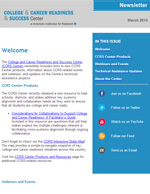 |
CCRS Center March 2014 E-Newsletter The CCRS Center works to help states and other CCRS stakeholders better inform, align, and support efforts to ensure that all students are ready for success in college and careers. Each newsletter will includes links to new CCRS Center products, information about CCRS-related events and webinars, and updates on the Center's technical assistance projects. |
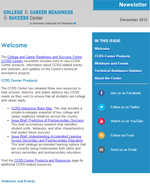 |
CCRS Center December 2013 E-Newsletter The CCRS Center works to help states and other CCRS stakeholders better inform, align, and support efforts to ensure that all students are ready for success in college and careers. Each newsletter will includes links to new CCRS Center products, information about CCRS-related events and webinars, and updates on the Center's technical assistance projects. |
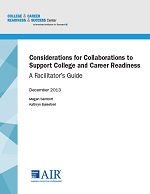 |
Considerations for Collaborations to Support College and Career Readiness: A Facilitator’s Guide This resource includes guiding questions and key considerations designed to help states explore the complex challenges inherent in facilitating cross-systems alignment through ongoing collaboration. Each question borrows from the systems research base derived from within and outside the field of education. The key considerations that accompany each question are designed to help users frame their own efforts within the conditions that the research base links to collaborative success. |
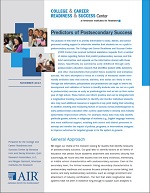 |
Predictors of Postsecondary Success This brief summarizes early childhood through early postsecondary education research that identifies student skills, behaviors, and other characteristics that predict future academic and workplace success. This information can support policymakers and practitioners as they begin to develop and validate factors that identify students who are on a path to postsecondary success as early as prekindergarten and throughout their academic career. |
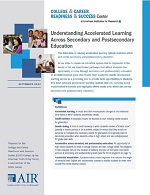 |
Understanding Accelerated Learning Across Secondary and Postsecondary Education This brief catalogs accelerated learning options that are currently being implemented and highlights efforts made both within and across secondary and postsecondary education. An education system that is responsive to the needs of all students must provide students opportunities to move through secondary and postsecondary education at an individualized pace that meets their needs. Accelerated learning serves as a promising tool to provide such opportunities to students. |
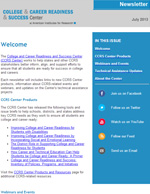 |
CCRS Center July 2013 E-Newsletter The CCRS Center works to help states and other CCRS stakeholders better inform, align, and support efforts to ensure that all students are ready for success in college and careers. Each newsletter will includes links to new CCRS Center products, information about CCRS-related events and webinars, and updates on the Center's technical assistance projects. |
|
|
Improving College and Career Readiness by Incorporating Social and Emotional Learning This issue brief was written to assist state policymakers in better understanding how social and emotional learning (SEL) can help students to be college and career ready. The brief provides a short description of what SEL is, why it is needed, and what it looks like in practice. In addition, examples of standards that support SEL at the federal and state levels, current SEL initiatives and programs, and outcomes and measures that can be used to assess SEL programming are described. |
|
|
Improving College and Career Readiness for Students with Disabilities This issue brief is intended to assist state policymakers in better understanding strategies to prepare students with disabilities and special needs for college and career. The brief provides context and background on the numbers of students with disabilities who are college and career ready; examines issues related to preparation and readiness for postsecondary education and careers; and includes examples of current programs and policies that help students with disabilities to successfully transition to college and career. |
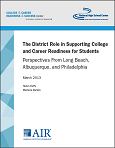 |
The District Role in Supporting College and Career Readiness for Students As school systems across the country recommit themselves to ensuring college and career readiness and success, they must rely on districts to translate federal and state policies into the local context. This brief builds upon recommendations from a 2009 Institute of Education Sciences (IES) Practice Guide that describes evidence-based practices that promote postsecondary access for high school students. |
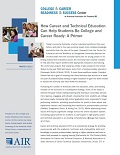 |
How Career and Technical Education Can Help Students Be College and Career Ready: A Primer If educators and policymakers are to make good on the national commitment to graduate more students from high school prepared to face postsecondary challenges, schools must continue to improve career technical education (CTE), ensuring that students have access to high-quality pathways to success. This brief provides an overview of the evolution of CTE in the U.S., reviews what CTE looks like in practice, and highlights issues CTE faces in the field that must be overcome for it to become an impactful and wide-reaching strategy for preparing students for postsecondary success. |
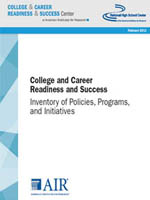 |
College and Career Readiness and Success: Inventory of Policies, Programs, and Initiatives This inventory, based on the College and Career Development Organizer, is designed to help users catalog policies, programs, and initiatives that support students on their pathways to success in college and careers. Intended primarily for Regional Comprehensive Centers and states, the tool can help users identify areas of strength as well as gaps or redundancies in current and planned activities, and reflect on state priorities and their alignment with these activities. |
 |
College and Career Readiness: A Quick Stats Fact Sheet This fact sheet offers findings and statistics on the current status of high school graduates' readiness for life after high school. It highlights some of the challenges and opportunities facing high school students after graduation as well as some of the consequences and implications for America’s underprepared graduates. |
|
|
Goals and Expectations for College and Career Readiness: What Should Students Know and Be Able to Do? This brief, the second in the College and Career Development Organizer series, summarizes the goals and expectations of college and career readiness that have been collected and organizes this information into three key threads: 1) Core Content; 2) Pathways Content; 3) Lifelong Learning Skills. Along with a brief description of each thread, key components are highlighted and examples of each type of goal and expectation are provided. |
|
|
Pathways and Supports for College and Career Preparation: What Policies, Programs, and Structures Will Help High School Graduates Meet Expectations? This brief, the third in the College and Career Development Organizer series, summarizes the pathways and supports of college and career preparation that have been collected and organizes this information into three key threads: 1) Personalized Learning Supports; 2) Rigorous Programs of Study; 3) Aligned Resources, Structures, and Supports. Along with a brief description of each thread, key components are highlighted and examples of each type of pathway and support are provided. |
|
|
Outcomes and Measures for College and Career Success: How Do We Know When High School Graduates Meet Expectations? This brief, the fourth in the College and Career Development Organizer series, summarizes the outcomes and measures of college and career success that have been collected and organizes this information into three key threads: 1) On-track indicators; 2) Attainment and authentication; 3) Accountability and improvement feedback. Along with a brief description of each thread, key components are highlighted and examples of each type of outcome and measure are provided. |
|
|
College and Career Development Organizer [Brief] In this brief, the National High School Center provides an overview of the College and Career Development Organizer. First, the brief describes the organizer and its intended use, providing specific examples of what it is and is not designed to do. Then, it walks potential users through the organizer to familiarize them with its content. Finally, the brief concludes with key considerations for those engaged in college and career readiness work. |
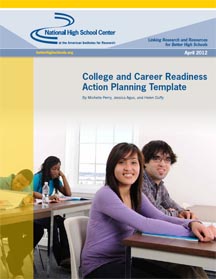 |
College and Career Readiness Action Planning Template The College and Career Readiness Action Planning Template includes ten overarching questions designed to help states discuss key areas of college and career readiness. Each question has a series of more detailed subquestions that can be used to further examine each college and career readiness topic area. |
|
|
College and Career Development Organizer This college and career development organizer was created to synthesize and organize an increasingly complicated and crowded field of college and career readiness initiatives. The organizer, composed of three strands, can be used to map the efforts of SEAs and LEAs as well as the many organizations devoted to researching and providing support for college and career readiness. The organizer can also be used as a set of building blocks to help SEA, LEAs, schools, and other organizations develop college and career readiness strategies and initiatives to address student needs. |
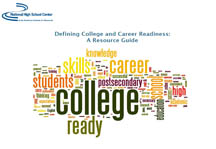 |
Defining College and Career Readiness: A Resource Guide This resource guide synthesizes information collected through a review of more than 70 organizations focused on college and career readiness. The guide includes:
|
